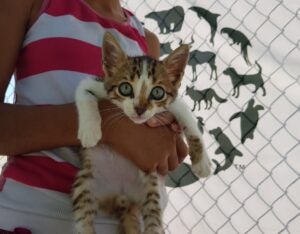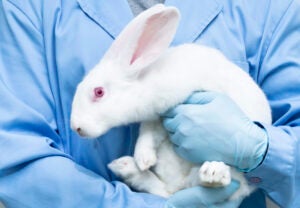
TORTUGUERO, Costa Rica—As part of a pilot project by Humane Society International to make Tortuguero, in Limon province, an animal-friendly community, 64 dogs and 19 cats received free preventive care during a two-day veterinary clinic. Tortuguero is a rural, isolated community in Costa Rica where access to veterinary care is limited.
During the clinic, a team of veterinary professionals provided free medical examinations, vaccinations, deworming, blood tests and other preventive care services for Tortuguero’s animals. A total of 83 companion animals received care at no cost, including 30 from the neighboring community of San Francisco, who were brought over by boat. Pet owners also learned about the impact companion animals can have on local wildlife and vice versa.
“The first phase of the program involved engaging with the community of Tortuguero to understand their concerns pertaining to animals. After understanding the community’s needs, we organized the program’s very first outreach clinic, and identified local individuals eager to champion animal welfare efforts. These ‘Animal Ambassadors’ will receive ongoing training and resources to develop, implement and sustain these activities over time,” Andrea Borel, executive director for HSI/Latin America explained.
One of those ambassadors, Víctor Barrantes, brought his two cats, Menguito and Frescolino, to the clinic for vaccinations and deworming. Victor rescued Menguito after finding him abandoned in a box and adopted Frescolino when the cat began visiting his yard searching for food. Victor says that caring for them has given him a new appreciation for animal welfare.
“I want Tortuguero to have a population of healthy pets who receive proper care, stay indoors and don’t disrupt the beach by digging into the turtles’ nests, With the Animal Ambassadors’ group, I believe we can gradually raise awareness and encourage people to treat pets as members of the family, as they should be,” Barrantes said.
Daneysha Rankin, a 16-year-old girl resident, also visited the clinic with her mother and her dog, Chopper, to ensure he received proper care: “I think it is very important to take responsibility for our pets. Today’s youth are consumed by technology―they prefer robot dogs over real ones. We need to change that mindset and appreciate the living beings around us. Sometimes we pay more attention to TikTok than to the animals that are always by our side,” she shared.
This pilot project has been developed in close collaboration with the National System of Conservation Areas (SINAC–MINAE), the Tortuguero National Park, the National Animal Health Service (SENASA), the School of Veterinary Medicine of the National University, the National Commission for Biodiversity Management (CONAGEBIO-MINAE), ASVO Costa Rica, the Tortuguero Environmental Committee, and Sea Turtle Conservancy, among others.
ENDS
Media contact: Alejandra Zúñiga: alezuniga@outlook.com








